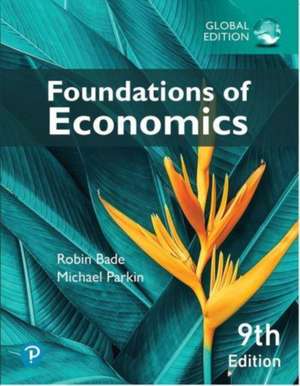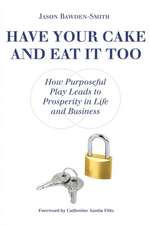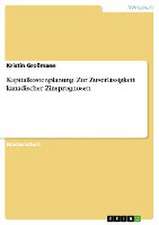Foundations of Economics, Global Edition
Autor Robin Bade, Michael Parkinen Limba Engleză Paperback – 22 iun 2022
For courses in economics.
An engaging, practice-orientedapproach to understanding core economic principles Foundationsof Economics introduces students to economicprinciples they can use to navigate the financial decisions of their futures.Each chapter concentrates on a manageable number of ideas, usually 3 to 4, witheach reinforced several times throughout the text. This patient approach helpsguide students through unfamiliar terrain and focus them on the most importantconcepts and key skills like reading and interpreting graphs. The 9thEdition continues to fine tune the content with more concise points, whilebringing it to life with interactive and digital features that createexcitement and engagement. It also motivates with compelling issues andquestions, and encourages learning with activities and practice questions, tohelp students grasp and apply economic principles to the real world. Afterusing these materials, students will have the foundational knowledge of how theeconomy works and can apply it to their lives going forward.
MyLab� Economics is not included. Students, if MyLab Economicsis a recommended/mandatory component of the course, please ask your instructorfor the correct ISBN. MyLab Economics should only be purchased when required byan instructor. Instructors, contact your Pearson representative for moreinformation.
Preț: 544.15 lei
Preț vechi: 591.47 lei
-8% Nou
Puncte Express: 816
Preț estimativ în valută:
104.13€ • 107.59$ • 86.62£
104.13€ • 107.59$ • 86.62£
Carte disponibilă
Livrare economică 22-28 februarie
Livrare express 12-18 februarie pentru 64.90 lei
Preluare comenzi: 021 569.72.76
Specificații
ISBN-13: 9781292434230
ISBN-10: 1292434236
Pagini: 984
Dimensiuni: 214 x 276 x 38 mm
Greutate: 2.09 kg
Ediția:9. Auflage
Editura: Pearson
ISBN-10: 1292434236
Pagini: 984
Dimensiuni: 214 x 276 x 38 mm
Greutate: 2.09 kg
Ediția:9. Auflage
Editura: Pearson
Notă biografică
Robin Bade was an undergraduate at theUniversity of Queensland, Australia, where she earned degrees in mathematicsand economics. After a spell teaching high school math and physics, sheenrolled in the PhD program at the Australian National University, from which shegraduated from in 1970. She has held faculty appointments at the University ofEdinburgh in Scotland, at Bond University in Australia, and at the Universitiesof Manitoba, Toronto, and Western Ontario in Canada. Her research oninternational capital flows appears in the International Economic Review andthe Economic Record. Robin first taught the principles of economics course in1970 and has taught it (alongside intermediate macroeconomics and internationaltrade and finance) most years since then. She developed many of the ideas foundin this text while conducting tutorials with her students at the University ofWestern Ontario.
MichaelParkin studiedeconomics in England and began his university teaching career immediately aftergraduating with a BA from the University of Leicester. He learned the subjecton the job at the University of Essex, Englands most exciting new universityof the 1960s, and at the age of 30 became one of the youngest full professors.He is a past president of the Canadian Economics Association and has served onthe editorial boards of the American Economic Review and the Journal ofMonetary Economics. His research on macroeconomics, monetary economics, andinternational economics has resulted in more than 160 publications in journalsand edited volumes, including the American Economic Review, the Journal ofPolitical Economy, the Review of Economic Studies, the Journal of MonetaryEconomics, and the Journal of Money, Credit, and Banking. He isauthor of the best-selling textbook, Economics (Pearson), now in its12th Edition.
Robin andMichael are a wife-and-husband team. Their most notable joint research createdthe Bade-Parkin Index of central bank independence and spawned a vast amount ofresearch on that topic. They dont claim credit for the independence of the newEuropean Central Bank, but its constitution and the movement toward greaterindependence of central banks around the world were aided by their pioneeringwork. Their joint textbooks include Macroeconomics (Prentice-Hall), ModernMacroeconomics (Pearson Education Canada), and Economics: Canada in theGlobal Environment, the Canadian adaptation of Parkin, Economics(Addison-Wesley). They are dedicated to the challenge of explaining economicsever more clearly to a growing body of students. Music, the theater, art,walking on the beach, and five grandchildren provide their relaxation and fun.
MichaelParkin studiedeconomics in England and began his university teaching career immediately aftergraduating with a BA from the University of Leicester. He learned the subjecton the job at the University of Essex, Englands most exciting new universityof the 1960s, and at the age of 30 became one of the youngest full professors.He is a past president of the Canadian Economics Association and has served onthe editorial boards of the American Economic Review and the Journal ofMonetary Economics. His research on macroeconomics, monetary economics, andinternational economics has resulted in more than 160 publications in journalsand edited volumes, including the American Economic Review, the Journal ofPolitical Economy, the Review of Economic Studies, the Journal of MonetaryEconomics, and the Journal of Money, Credit, and Banking. He isauthor of the best-selling textbook, Economics (Pearson), now in its12th Edition.
Robin andMichael are a wife-and-husband team. Their most notable joint research createdthe Bade-Parkin Index of central bank independence and spawned a vast amount ofresearch on that topic. They dont claim credit for the independence of the newEuropean Central Bank, but its constitution and the movement toward greaterindependence of central banks around the world were aided by their pioneeringwork. Their joint textbooks include Macroeconomics (Prentice-Hall), ModernMacroeconomics (Pearson Education Canada), and Economics: Canada in theGlobal Environment, the Canadian adaptation of Parkin, Economics(Addison-Wesley). They are dedicated to the challenge of explaining economicsever more clearly to a growing body of students. Music, the theater, art,walking on the beach, and five grandchildren provide their relaxation and fun.
Cuprins
PART 1:INTRODUCTION 1. Getting Started 2. The US and Global Economies 3. The Economic Problem 4. Demand and Supply
PART 2: ACLOSER LOOK AT MARKETS 5. Elasticities of Demand and Supply 6. Efficiency of Fairness and Markets
PART 3: HOWGOVERNMENTS INFLUENCE THE ECONOMY 7. Government Actions in Markets 8. Taxes 9. Global Markets in Action
PART 4:MARKET FAILURES AND PUBLIC POLICY 10. Externalities 11. Public Goods and Common Resources 12. Private Information andHealthcare Markets
PART 5: ACLOSER LOOK AT DECISION MAKERS 13. Consumer Choice and Demand 14. Production and Cost
PART 6:PRICES, PROFITS, AND INDUSTRY PERFORMANCE 15. Perfect Competition 16. Monopoly 17. Monopolistic Competition 18. Oligopoly
PART 7:INCOMES AND INEQUALITY 19. Markets for Factors of Production 20. Economic Inequality
PART 8:MONITORING THE MACROECONOMY 21. GDP: A Measure of TotalProduction and Income 22. Jobs and Unemployment 23. The CPI and the Cost of Living
PART 9: THEREAL ECONOMY 24. Potential GDP and the NaturalUnemployment Rate 25. Economic Growth 26. Finance, Saving, and Investment
PART 10: THEMONEY ECONOMY 27: The Monetary System 28: Money, Interest, and Inflation
PART 11:ECONOMIC FLUCTUATIONS 29. Aggregate Supply and AggregateDemand 30. Aggregate Expenditure Multiplier 31. The Short-Run Policy Tradeoff
PART 12: MACROECONOMIC POLICY 32. Fiscal Policy 33. Monetary Policy 34. InternationalFinance
PART 2: ACLOSER LOOK AT MARKETS 5. Elasticities of Demand and Supply 6. Efficiency of Fairness and Markets
PART 3: HOWGOVERNMENTS INFLUENCE THE ECONOMY 7. Government Actions in Markets 8. Taxes 9. Global Markets in Action
PART 4:MARKET FAILURES AND PUBLIC POLICY 10. Externalities 11. Public Goods and Common Resources 12. Private Information andHealthcare Markets
PART 5: ACLOSER LOOK AT DECISION MAKERS 13. Consumer Choice and Demand 14. Production and Cost
PART 6:PRICES, PROFITS, AND INDUSTRY PERFORMANCE 15. Perfect Competition 16. Monopoly 17. Monopolistic Competition 18. Oligopoly
PART 7:INCOMES AND INEQUALITY 19. Markets for Factors of Production 20. Economic Inequality
PART 8:MONITORING THE MACROECONOMY 21. GDP: A Measure of TotalProduction and Income 22. Jobs and Unemployment 23. The CPI and the Cost of Living
PART 9: THEREAL ECONOMY 24. Potential GDP and the NaturalUnemployment Rate 25. Economic Growth 26. Finance, Saving, and Investment
PART 10: THEMONEY ECONOMY 27: The Monetary System 28: Money, Interest, and Inflation
PART 11:ECONOMIC FLUCTUATIONS 29. Aggregate Supply and AggregateDemand 30. Aggregate Expenditure Multiplier 31. The Short-Run Policy Tradeoff
PART 12: MACROECONOMIC POLICY 32. Fiscal Policy 33. Monetary Policy 34. InternationalFinance












